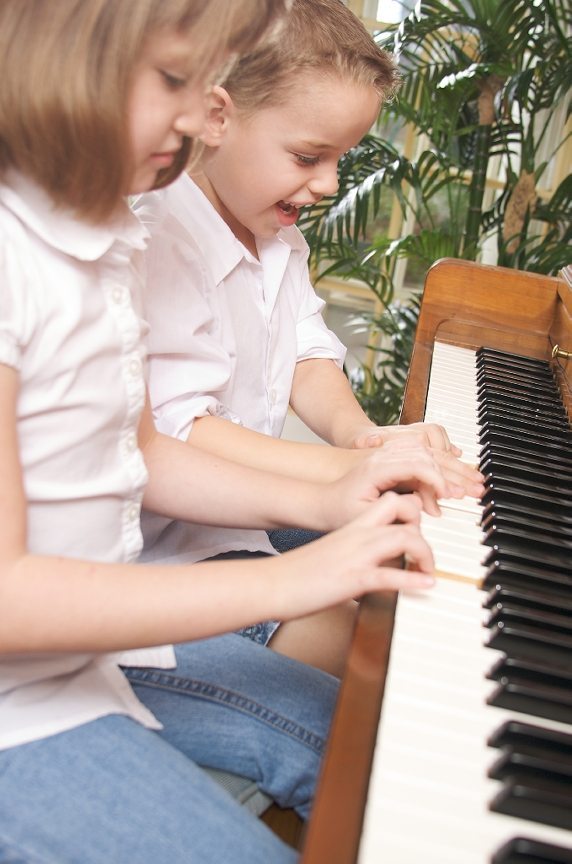Ask most people when the best time to begin giving your child music lessons, and they’ll probably 
Would you believe the time to start piano music lessons may be more like five or six months?
There’s been an increasing body of scientific research in recent years about the effects of music training on children from a very early age, and it’s virtually all positive. There’s actually very little reason not to start teaching your child piano music from the point they’re old enough to push the keys!
Music Training Helps Build Babies’ Brains
A study last year from McMaster University reported some unexpected results when dealing with a test program teaching infants and toddlers extremely basic piano skills and tonal recognition. When done along with plenty of reinforcement, babies in the program ended up performing surprisingly well in in a lot of areas.
As one might expect, the piano-trained children showed more advanced music skills, including a preference for tonal over atonal or off-key music. (Apologies to fans of Ligeti.) However, the interesting part is that all these children had much better-developed social skills as well!
The piano-trained tykes were better-able to handle new stimuli without getting upset, and recovered more quickly when upset. There were also distinct signs of increased hand-eye co-ordination. The musical babies were more likely to point and gesture as part of their communications, earlier than the control group that only listened to CDs rather than creating music.
This, of course, only adds to the body of work showing how important musical training can be to children as they develop.
The Benefits Of Early Piano Music Training Continue To Pay Off
So, really, there are plenty of reasons that any parent should look into starting their child on music as early as possible. However, if we had to pick our top five, they’d be:
-
Music stays with them. Like learning to ride a bike, musical training never wears off. Even if the piano-playing fingers get a little rusty, the muscle memory comes back easily. Skills like tone identification, music theory, and the ability to read sheet music are very slow to fade, and very quick to return no matter how old your child gets!
-
It’s never easier for them. Musical learning takes place in many of the same areas of the
brain as speech – our brains basically treat it like language. So, like any language, children learn music far more easily in the first years than at any time in their lives. (Plus, they’re far too young to pout over how they’d rather ditch piano class to hang with their friends!)
-
It (probably) helps develop their native intelligence. We can’t officially call this one 100% confirmed, but there is still a large scientific body of work linking early-age musical training with improvements in a range of cognitive functions, including mathematics, abstract reasoning, and spacial perception. There’s a lot of reason to believe that piano music helps build your child’s brain.
-
Musicality is never out-of-date. As rapidly as the world whirls about us these days, it’s hard to know which skills will really benefit your child in the long run. So many skills are falling into disuse these days, but you know what? Music isn’t one of them, and it will never be. A background in music is something your child will be able to make use of, over and over, for decades to come.
-
Music brings better emotional control. As the study above and others have shown, music virtually always brings better emotional control and social skills. EQ is at least important as IQ, and piano music (probably) helps boost both!
So, for readers with kids, when did you start your child’s music training?







 brain as speech – our brains basically treat it like language. So, like any language, children learn music far more easily in the first years than at any time in their lives. (Plus, they’re far too young to pout over how they’d rather ditch piano class to hang with their friends!)
brain as speech – our brains basically treat it like language. So, like any language, children learn music far more easily in the first years than at any time in their lives. (Plus, they’re far too young to pout over how they’d rather ditch piano class to hang with their friends!)